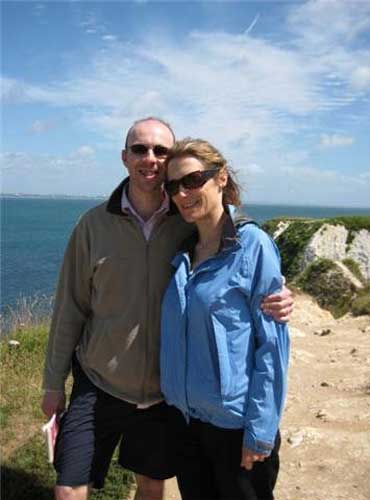Wealth Check: 'We need to prepare for a move overseas'

Laura and James Dunn, a research scientist and a nurse from Southampton, are looking forward to a life-changing move to Australia in the New Year. But they are confused and concerned about how to make the most of their money both here and abroad.
"Laura and I are moving to Melbourne in January," says James. "We have a mix of bank accounts, savings and ISAs between us. We hope to sell our flat, but if we do we need to know how best to protect the proceeds of the sale. The fluctuating exchange rate makes us unsure about how best to transfer money to Australia, and we would greatly appreciate any advice on how to make the most out of our savings and investments from outside the UK."
Case notes
Salary: combined, they earn £60,000 a year.
Monthly outgoings: they spend £4,520 on living expenses, holidays, cars, and other costs as well as tax and National Insurance contributions.
Mortgage: £350 a month on a £145,000 property.
Savings: around £35,000 in savings between them.
Pension: they currently pay around £160 a month each into final salary pension schemes.
Debts: £0.
Three financial advisers offer Laura and James help this week: Ian Smith of Central Financial Planning, Ian Pealin of Evolve Financial Planning, and Alan Dick of Forty Two Wealth Management.
Tax and exchange rates
"Seeking advice from a UK accountant with knowledge of Australian tax, or vice versa is likely to be a good investment," says Ian Pealin. "The couple have little invested in shares and unit trusts, so they are unlikely to get hit by the Foreign Investment Fund tax.
"But it is important that Laura and James get to grips with the definition of 'residence' for UK tax purposes," he warns. "To be a tax resident in the UK an person must be physically present in the UK at some time during the tax year, although an individual's residence status in other countries is irrelevant in determining UK tax residency." There is a double taxation agreement in place between Australia and the UK, which means you should get credit for tax paid in the UK, and won't be charged twice.
All three advisers recommend opening a bank account in Australia before they leave the UK, preferably with one that has outlets in the UK.
Savings & investment
"James and Laura can continue to hold their existing investments and savings accounts in the UK, including ISAs," Pealin adds. "But they will not be able to add to their ISAs when they become non-residents. The interest may also be subject to tax in Australia.
"If their stay is likely to remain temporary it could be worthwhile retaining savings in the UK because of the higher interest rates here, but they should continue to monitor the situation and bear exchange rates in mind," he adds.
Meanwhile, Alan Dick suggests the Dunns should group their ISA savings. "They currently tend to start new cash ISAs each tax year rather than consolidate then in a single account," he says. "They should review the market for the best cash ISA rate, then transfer all their existing cash ISAs to this account. I suggest this money, plus their emergency fund of £25,000 should remain in sterling in the UK. Even the cash ISAs should be manageable online, and using an internet-based account means they can transfer money to Australia as and when they need it."
Property
"The situation regarding the Dunn's flat is interesting," says Dick. "They could rent it, but the rental income doesn't seem like a great return.
"However, they may have to accept a knock down price to shift the property – if they can even sell at all."
But if the Dunns sold their property now they would benefit from 100 per cent tax relief against capital gains tax, as it is their principle private residence. However, if they sell in future they would not be able to claim this and may be liable to CGT.
If they did sell their property, Dick urges them, as risk averse investors, to "invest the proceeds in a well diversified portfolio of low cost passive investment funds such as index tracking unit trusts and exchange traded funds."
Pension
As a member of the NHS, Laura has a very attractive final salary scheme, and James has a similar pension, but neither are likely to be able to continue these schemes in Australia. And Smith warns that transferring pension funds to Australia is complex. "Because James and Laura are considering returning to the UK in the medium to long term, the advisers suggest leaving their pension plans in place. "When they return to the UK the Dunns can contribute up to 100 per cent of their earnings into a pension and obtain tax relief," adds Smith. "So it may be worth only contributing the minimum amount while in Australia, but making regular savings that could then be paid into a UK plan on their return."
For a free financial check-up, write to Wealth Check, The Independent, 191 Marsh Wall, London E14 9RS; or email cash@independent.co.uk
Subscribe to Independent Premium to bookmark this article
Want to bookmark your favourite articles and stories to read or reference later? Start your Independent Premium subscription today.

Join our commenting forum
Join thought-provoking conversations, follow other Independent readers and see their replies